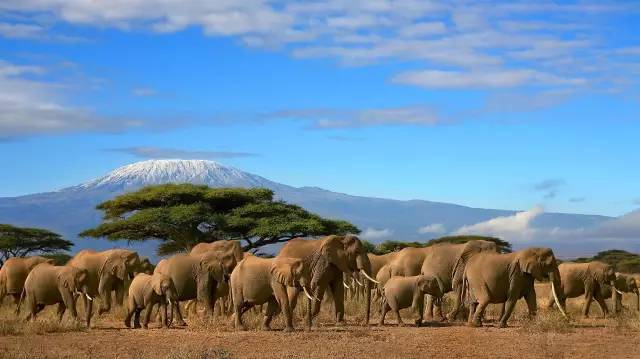


The main reason Chinese people want to travel to Africa over the summer is to witness spectacular animal migrations. [File photo: huanqiu.com]
Chinese tourists looking to beat the heat on their summer vacation are swarming to an unexpected destination - Africa.
China has just experienced its hottest July since 1961, with Shanghai hitting a record-breaking 40.9 C.
Over July and August this year, the number of online bookings for trips to Africa has been double what it was last year, according to travel agent Lvmama Tourism.
Most of these travelers are under 40, Lvmama says.
Data released by booking platforms shows that the average trip is eight days long and costs anywhere from 7,800 yuan ($1,169) to 48,000 yuan.
Reports on this phenomenon have sparked surprise on Chinese social media platforms as many people stereotypically think of Africa as always being very hot, with the hashtag "travelling to Africa to avoid the heat" garnering more than 3 million clicks on Sina Weibo as of press time.
While many countries in Africa do experience high temperatures, some of the continent's top travel destinations are quite cool during July and August. Mauritius, Kenya and South Africa all boast comfortable conditions of around 16 to 20 C at this time of year.
Also, many parts of southern and eastern Africa are highlands with altitudes over 1,000 meters, which helps cool the climate, Ma Ding, director of overseas affairs at BTG International Travel & Tours, told the Global Times.
The most popular African destinations to "avoid the heat" include Mauritius, Kenya, Morocco, South Africa and Tunisia, said Lvmama.
Checking out the wildlife
Though travel agencies are marketing their package holidays as "heat-avoiding" journeys, many of the agencies reached by the Global Times said the main reason people want to travel to the continent over the summer is to witness spectacular animal migrations.
A 32-year-old surnamed Li, who spend a week and over 40,000 yuan on observing this kind of migration in Kenya, told the Global Times that around half the tourists he met while in the country are Chinese.
"It's a tough journey compared with travelling to Europe and the US. Road conditions are bad, dust is everywhere and the food does not suit my taste. But when you see the unique animals, everything is worthwhile," he said.
Other activities popular with Chinese include driving around Kenya and scuba diving in Egypt, said Ma.
Meanwhile, with direct flights and the relaxation of visa policies, travelling to Africa is becoming more convenient as countries are trying to attract more Chinese tourists, said tourist agencies.
As of the end of July, Mauritius, Morocco, the Seychelles and the French overseas territory Reunion Island offer visa free entry to Chinese nationals.
In 2008, only 2.8 percent of Chinese tourists went to Africa. But by 2016, that number had more than tripled to 10 percent with 11.3 million travelling to Africa, news site huanqiu.com reported, citing data from the World Tourism Organization.
The number of Chinese tourists visiting Africa has grown by 50 percent every year on average since 2010, the Xinhua News Agency reported.
The increase has led many African businessmen to focus more on attracting Chinese customers. For instance, many Moroccan restaurants now offer Chinese-language menus.
Some Moroccan hotels even promote themselves on well-known Chinese websites and booking platforms, said travelers. A traveler surnamed Qi said that posting a positive Chinese-language review of her hotel on TripAdvisor even landed her a 20 percent discount to her bill.
Articles titled "How to attract Chinese tourists to visit your destination" have been reposted and shared on social media platforms popular in Africa. Suggestions include making the business Chinese-friendly by using signs in Chinese and offering Chinese food, as well as "making it easier for Chinese to pay," such as using China Union Pay, Alipay and WeChat Wallet.
Though the number of Chinese travelling to Africa is increasing, they constitute only a small proportion of the total number of outbound tourists, said Ma, adding that the high prices and as well as personal safety are major concerns.
The tourist industries of many African countries are comparatively immature, as their infrastructure is yet to be developed and their emergency services systems are not as developed as Western counties', said Ma.
 Fire brigade in Shanghai holds group wedding
Fire brigade in Shanghai holds group wedding Tourists enjoy ice sculptures in Datan Town, north China
Tourists enjoy ice sculptures in Datan Town, north China Sunset scenery of Dayan Pagoda in Xi'an
Sunset scenery of Dayan Pagoda in Xi'an Tourists have fun at scenic spot in Nanlong Town, NW China
Tourists have fun at scenic spot in Nanlong Town, NW China Harbin attracts tourists by making best use of ice in winter
Harbin attracts tourists by making best use of ice in winter In pics: FIS Alpine Ski Women's World Cup Slalom
In pics: FIS Alpine Ski Women's World Cup Slalom Black-necked cranes rest at reservoir in Lhunzhub County, Lhasa
Black-necked cranes rest at reservoir in Lhunzhub County, Lhasa China's FAST telescope will be available to foreign scientists in April
China's FAST telescope will be available to foreign scientists in April "She power" plays indispensable role in poverty alleviation
"She power" plays indispensable role in poverty alleviation Top 10 world news events of People's Daily in 2020
Top 10 world news events of People's Daily in 2020 Top 10 China news events of People's Daily in 2020
Top 10 China news events of People's Daily in 2020 Top 10 media buzzwords of 2020
Top 10 media buzzwords of 2020 Year-ender:10 major tourism stories of 2020
Year-ender:10 major tourism stories of 2020 No interference in Venezuelan issues
No interference in Venezuelan issues
 Biz prepares for trade spat
Biz prepares for trade spat
 Broadcasting Continent
Broadcasting Continent Australia wins Chinese CEOs as US loses
Australia wins Chinese CEOs as US loses